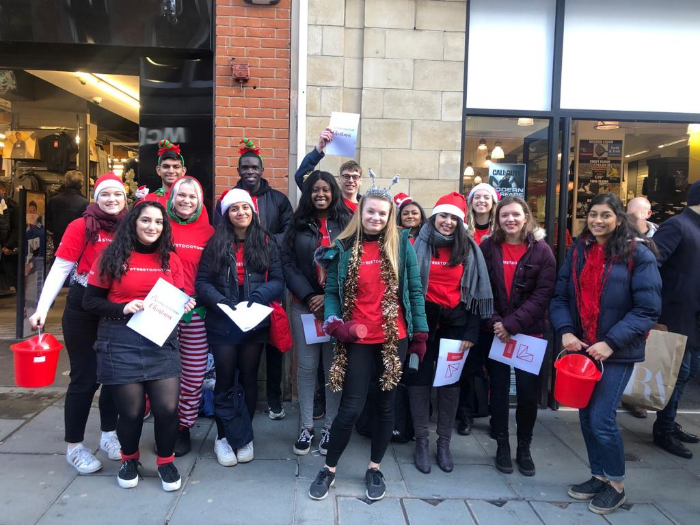March 5, 2021, by School of Medicine
50 at 50: StreetDoctors
 Youth violence is a serious problem in many cities across our nation. Between September 2019 and September 2020, there were 47,119 offences involving knives or sharp objects recorded by the police in England and Wales (1). These offences have been rising since 2014 and although in recent years the rate of increase has slowed, even one offence is too many. The cost of this violence to the NHS is estimated at £2.9 billion each year (2). However, this value fails to account for the traumatic impact violence leaves not only on the victims and perpetrators but also on the wider community in which these offences take place. Young people exposed to violence within their family and community are more likely to be involved in violence themselves. Violence also leaves young people at greater risk of developing social and mental health issues (3). It is essential we empower young people to understand the impact of youth violence to not only prevent violence from happening but also to reduce the impact when it does.
Youth violence is a serious problem in many cities across our nation. Between September 2019 and September 2020, there were 47,119 offences involving knives or sharp objects recorded by the police in England and Wales (1). These offences have been rising since 2014 and although in recent years the rate of increase has slowed, even one offence is too many. The cost of this violence to the NHS is estimated at £2.9 billion each year (2). However, this value fails to account for the traumatic impact violence leaves not only on the victims and perpetrators but also on the wider community in which these offences take place. Young people exposed to violence within their family and community are more likely to be involved in violence themselves. Violence also leaves young people at greater risk of developing social and mental health issues (3). It is essential we empower young people to understand the impact of youth violence to not only prevent violence from happening but also to reduce the impact when it does.

A group of our Nottingham Volunteers carol signing in Nottingham City Centre to fundraise for StreetDoctors
It is from this need that StreetDoctors was founded in 2008. StreetDoctors is a charity that aims to empower individuals affected by violence to keep themselves and their communities safe. We do so by educating young people about the medical consequences of carrying weapons and explore their attitudes to violence. As well as this, we teach simple emergency first-aid, such as how to respond to an unconscious or bleeding person.
As a group of healthcare student volunteers, we work in partnership with a range of delivery partners, ranging from schools to community groups, and criminal justice organisations. This allows us to reach out to those most at risk of youth violence. There are currently 22 teams across 17 different cities in the UK and Ireland, and together we have taught over 18,000 individuals. Locally in Nottingham, we were able to teach 372 young people between 2019-2020. Ultimately, we hope to equip young people across the country with the confidence and practical skills they need to act as StreetDoctors in their own communities.
In response to the COVID-19 pandemic, our approach to teaching has changed. We are now delivering teaching sessions over Zoom and have adapted our resources to an online platform to offer a similar level of interaction. Most of our volunteers have been trained to deliver teaching digitally through a series of workshops and have been well-supported through this process.
 Despite not being able to carry out face-to-face teaching, it has been wonderful to see the level of engagement young people have in the digital sessions. Moving to an online platform has led to a multitude of benefits. For example, we have noticed that some students have felt more confident to engage with the session and ask questions due to the anonymised features available. As well as this, we have been able to work with other teams across the country to cover more geographical locations that may have otherwise not been feasible.
Despite not being able to carry out face-to-face teaching, it has been wonderful to see the level of engagement young people have in the digital sessions. Moving to an online platform has led to a multitude of benefits. For example, we have noticed that some students have felt more confident to engage with the session and ask questions due to the anonymised features available. As well as this, we have been able to work with other teams across the country to cover more geographical locations that may have otherwise not been feasible.
In addition to our teaching, we regularly try to promote the work of StreetDoctors to the wider public through our social media and fundraising activities. Our work has been featured on BBC Crimewatch and more recently on an episode of the Waiting Room podcast by Dr Alex George, the newly appointed government mental health ambassador. Despite barriers imposed by the pandemic, we have been able to organise bake sales and a running competition to help raise vital funds to continue the lifesaving work we do. If you’re interested in keeping up to date with our activities or getting involved yourself please visit our social media pages listed below.
Instagram.com/streetdoctorsnottingham
Facebook.com/StreetDoctorsNottingham
Written by Simran Dhugga and Anjali Mehta
Footnotes
- Statistics OfN. Crime in England and Wales: year ending September 2020. 2021.
- Observatory NWPH. 2012 2012.
- Clissold-Lesser S. Young People are part of the answer to preventing and reducing violence – we just need to believe in them. Magistrates Magazine 2021.
No comments yet, fill out a comment to be the first

Leave a Reply